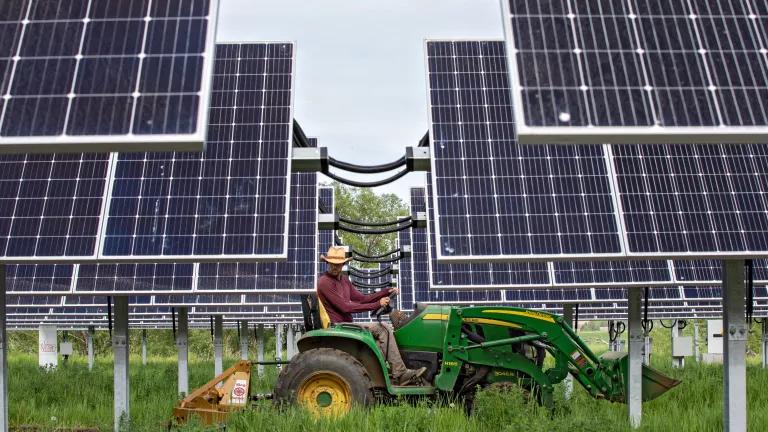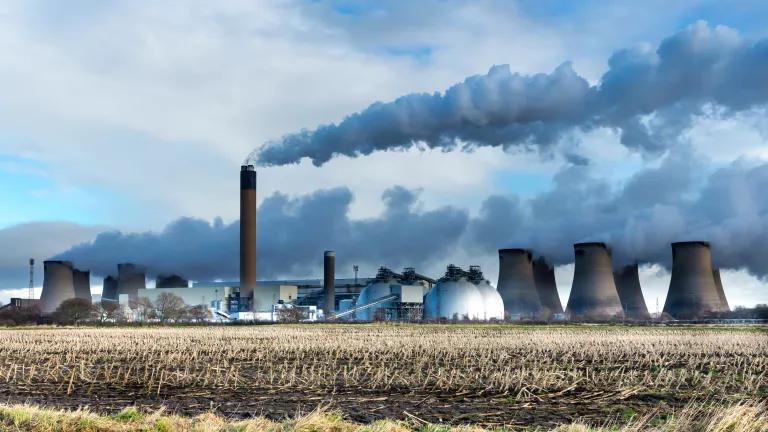Cutting Down Forests Is Not a Climate Solution

Part of NRDC's Year-End Series Reviewing 2018 Climate & Clean Energy Developments
The case for biomass energy, such as it was, collapsed in 2018. While we have long argued that uprooting forests and burning the wood for electricity makes no sense, a raft of new scientific studies, policy documents and economic analyses confirmed its backwardness beyond a reasonable doubt this year.
Given this irrefutable case, we can all hope that the existing biomass plants are phased out over the coming years and no other investors get the dumb idea to build new projects. Burning wood for fuel made sense in the 19th century but its utility ended a century ago.
The obvious reason why is climate change. Trees are the single best device that we’ve got for sucking carbon out of the air. Increasing forest cover, protecting grasslands and improving agricultural practices can help our Earth store more carbon, forestalling climate change. Given the warning from the Intergovernmental Panel on Climate Change that the next decade is most crucial to slash emissions if we want to avoid the worst of climate disasters, we can’t play games with false solutions. We need an immediate and rapid transformation of our energy system, starting with the electricity sectors, where genuinely zero-carbon technologies like energy efficiency, solar and wind are already readily available, reliable, affordable, and expanding rapidly.
So, what happened this year?
The U.K.’s Damp Squib on Climate
For many years, the U.K. has been the world’s largest consumer of wood pellets and the foremost defender of burning biomass to fuel power plants as a way to reduce emissions. The wood-burning monstrosities at Drax Power Station in Yorkshire relied heavily on billions of pounds in subsidies from the U.K.’s taxpayers.
In the country’s justified haste in quitting its addiction to coal, it embraced another dangerous narcotic, biomass. But now the nation’s leaders and policy experts are coming to realize that biomass is as green as a lump of coal.
While the term “biomass” can seem anodyne, a shocking investigative report by the Channel 4 show Dispatches exposed the destruction of unique hardwood forests in the U.S. that is behind the U.K.’s unquenchable hunger for wood pellets.
A report this year from the country’s official climate advisory committee also made clear that the current biomass carbon accounting system is flawed. It recommended no additional public support for biomass-fueled power plants that pump their carbon emissions into the atmosphere.
Biomass should only be used where there are few carbon beneficial alternatives, Lord Deben, the chairman of the climate committee, told the publication Carbon Brief. “You don’t burn it in boilers; you use it to make airplane fuel," he said.
The U.K. government itself belatedly acknowledged this fact: It set a greenhouse-gas emissions limit for new biomass plants that not a single one of the existing plants could meet. In effect, this means there won’t be any subsidies for new biomass plants burning imported pellets—but the ones already operating can continue their unrestrained carbon polluting. (Without subsidies, it’s hard to imagine that any new biomass plants of this kind could ever get built.)
The science is clear, a separate group of 800 scientists wrote to the European Commission: biomass is not a way to fight climate change. And while industry argues that these plants are needed to provide reliable electricity, an analysis by Vivid Economics and Imperial College showed that in place of burning wood pellets, the U.K. can slash emissions by ramping up solar and wind power, and smart resources like batteries.
Scott Pruitt Can’t Save Biomass in the U.S.
While the U.K. is moving (too slowly!) away from burning biomass, the Trump administration, predictably, is trying to help that struggling industry in the U.S. In April, then-EPA Administrator Scott Pruitt published an anti-science and procedurally underhanded “Statement of Agency Policy” asserting that biomass is carbon neutral.
It didn’t take a mattress from Trump International Hotel to smother that mischaracterization. EPA’s own scientific advisers took care of it themselves, coming out with a finding a few months later that undercut Pruitt’s declaration. And, while this is yet to be resolved within the agency, it has been refuted in the vast majority of peer-reviewed literature on the subject, and opposed by many hundreds of scientists around the world.

From Austin, Texas to Hibbing, Minnesota, biomass plants are revealing themselves to be the costly economic boondoggles we long suspected.
In Minnesota, the legislature passed a bill allowing Xcel Energy to negotiate a shutdown of three biomass plants; the power producer argued the cost of power from those facilities was just too expensive.
In Gainesville, Florida the city bought out an existing biomass plant—at a cost of more than $700 million—in order to get out from under a long-term contract that would have saddled it with expensive power for years to come. It cost the city less to purchase the plant outright and generate its own power than to keep buying the power under the existing contract.
According to the Texas Monitor, in Austin “for almost six years, Austin Energy customers have been paying about $54 million a year for a power plant in East Texas not to produce biomass energy. Those customers also paid $128 million to build the plant.”
Think about that: building a biomass plant and then buying power from another supplier!—because it is cheaper than producing the power from biomass. Now that is a bad investment.
And in New Hampshire, the state’s largest utility, Eversource, is rebuffing a bill that requires utilities to purchase power from biomass plants at inflated prices. The controversy is a perfect example of forestry industry imposing its narrow interest at the expense of electricity customers.
Then there’s Dominion Resources in Virginia. The power producer has long been a vociferous champion of biomass energy, arguing it could tap the natural resources in the state as a low-cost fuel source. This year it changed course.
In April, Dominion announced its intention to retire its largest wood-burning biomass power plant. The company also plans to cut its reliance on its other three biomass plants to about 10 percent of the time in most years. Dominion’s decision comes on the heels of an NRDC-commissioned study that shows just how expensive Dominion's bioenergy is compared to clean energy alternatives.
So, the lessons from the U.K. and U.S. are clear: Biomass is bad for the climate and can’t compete against lower-cost truly green alternatives like energy efficiency, wind and solar. We need to keep up the pressure so our political leaders recognize the woeful case for burning wood for electricity and don’t try to sneak new subsidies in place to help these plants.
Still, other threats remain.
A recent report by the Environmental Paper Network shows that Asian nations such as China, Japan and South Korea are planning new biomass plants and could spur new demand. This is a significant risk for our forests and our climate, but the science and economics are on our side. We must ensure the mistakes made in Yorkshire and Minnesota aren’t repeated in Daesan or Kanda.



